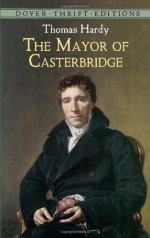
|
| Name: _________________________ | Period: ___________________ |
This test consists of 5 multiple choice questions, 5 short answer questions, and 10 short essay questions.
Multiple Choice Questions
1. Henchard's education is compared to whom?
(a) Achilles.
(b) Aeneas.
(c) Aristotle.
(d) Plato.
2. Four pennies are used to keep Susan's eyes closed. What becomes of them after Martha buries them?
(a) Coney digs it out to use for drink.
(b) Abel finds them by accident and brings them back to his mother.
(c) It rusts and and stays buried with the Romans of historical past.
(d) Elizabeth digs it out to keep.
3. Where does Donald set up his new business?
(a) Dunnigan Hill.
(b) Durnover Hill.
(c) Bowling Walk.
(d) West Walk.
4. Why does Lucetta invite Elizabeth to live with her?
(a) To give Henchard an excuse to visit her home.
(b) To take Elizabeth away from Henchard's demeaning home.
(c) To get Elizabeth closer to Farfrae.
(d) To teach Elizabeth a more refined way of living.
5. What do the people of Casterbridge know of the mayor's past wife?
(a) They know nothing.
(b) They don't think the mayor is ever married since he comes to Casterbridge alone.
(c) She leaves him for another man.
(d) They believe she dies at sea.
Short Answer Questions
1. In chapter 24, what makes Elizabeth upset?
2. At the scene of the wagon crash, when Henchard's man says the word of Lucetta and Elizabeth Jane are not to be accounted for because all women swoon for Donald, Henchard __________.
3. How do Susan and Elizabeth pay for their lodgings, despite their little income?
4. What is Farfrae's initial impression of Elizabeth Jane?
5. What is Lucetta's initial response when she meets Farfrae?
Short Essay Questions
1. When Susan dies, Henchard agrees to marry Lucetta out of pity. He still does not call on her when she arrives to Casterbridge. Suddenly, he is adamant about getting her attention and marrying her. What causes the sudden change of heart? What does Henchard want from this?
2. Abel Whittle is chronically late and with many warnings, he continues to be late. Fed up, Henchard heads to Abel's house and makes him get to the granary without breeches on. Farfrae argues that the joke goes too far and Abel should get him and dress. Henchard contends that it is to teach Abel a lesson and that this is no joke. When Henchard sells Susan to Newson, it too starts off as a joke. Henchard and all present blames the rum. Compare the two situations and Henchard's character. How much of the rum is to blame for the joke getting out of hand? If Farfrae is not there to stop the punishment, does Henchard continue on with the lesson?
3. Lucetta shows she is capable of greedy motivations. Yet, she is also victim to Henchard's forceful behaviors. When she returns from Port-Bredy married to Farfrae, Henchard hollers his disapproval and for her to get away. When she does, she enters her home through the backdoor? Knowing what the back alley represents, why does she choose at this time to use this entrance?
4. When Henchard writes a note to Susan, he also gives five guineas in return. What does Henchard hope to portray in this gift? How does Susan react to the money when she sees it?
5. Henchard shows both happiness and reservations concerning Susan's return. Henchard plans to remarry and care for his family. However, in his note to Susan, he writes, "The news upsets me almost," and in their meeting he states, "But- to lead me into ... this difficulty about our living together ..." What is going through Henchard's mind as he learns of his wife's return? Does he love her or is he obliged to a duty? What causes his reservations?
6. Before Michael discovers who Elizabeth's real father is, he wants her to legally change her name to Henchard. For whom does he want this? How does Michael regard Elizabeth's feelings in this matter? Is it for them as a relationship as purely for his selfish wants?
7. When the new farming machinery is shown in the marketplace, Lucetta and Elizabeth look at it with inquiry. Lucetta describes it as an agricultural piano and Elizabeth states that it is something to do with corn. These statements are very different, as is there personality. Compare and contrast their response to the machine and how it reflects their personality.
8. Although Hardy reveals that Henchard is not in love with Susan, he feels defensive when the boys around town call Susan, "The Ghost". Does he really love her and does not know it? Is he defensive to protect his own name? Is Henchard a better man that he reveals himself to be?
9. When Henchard first learns about Donald's popularity, he cannot help but be jealous. However, he sees Donald as a genuinely good man who cares for people's feelings. What internal battle does Henchard experience concerning Donald Farfrae? How does he personally feel about Farfrae? How does this affect his natural jealousy?
10. At first request, Michael is agreeable to let Elizabeth leave and gain independence. But when the time comes for her to leave, he gets angry and flustered at the idea. Why does Henchard react with such contradiction?
|
This section contains 2,002 words (approx. 7 pages at 300 words per page) |

|




